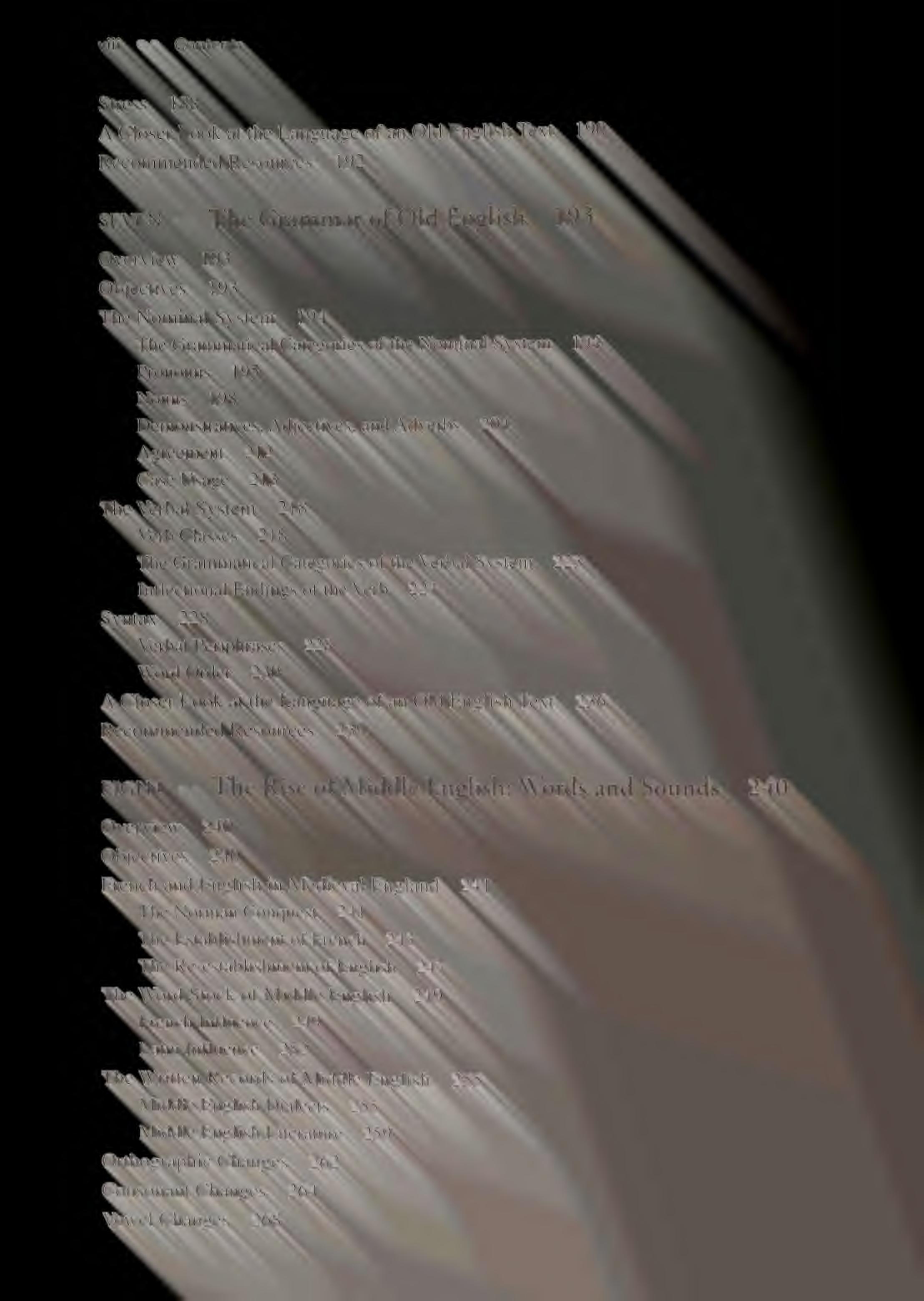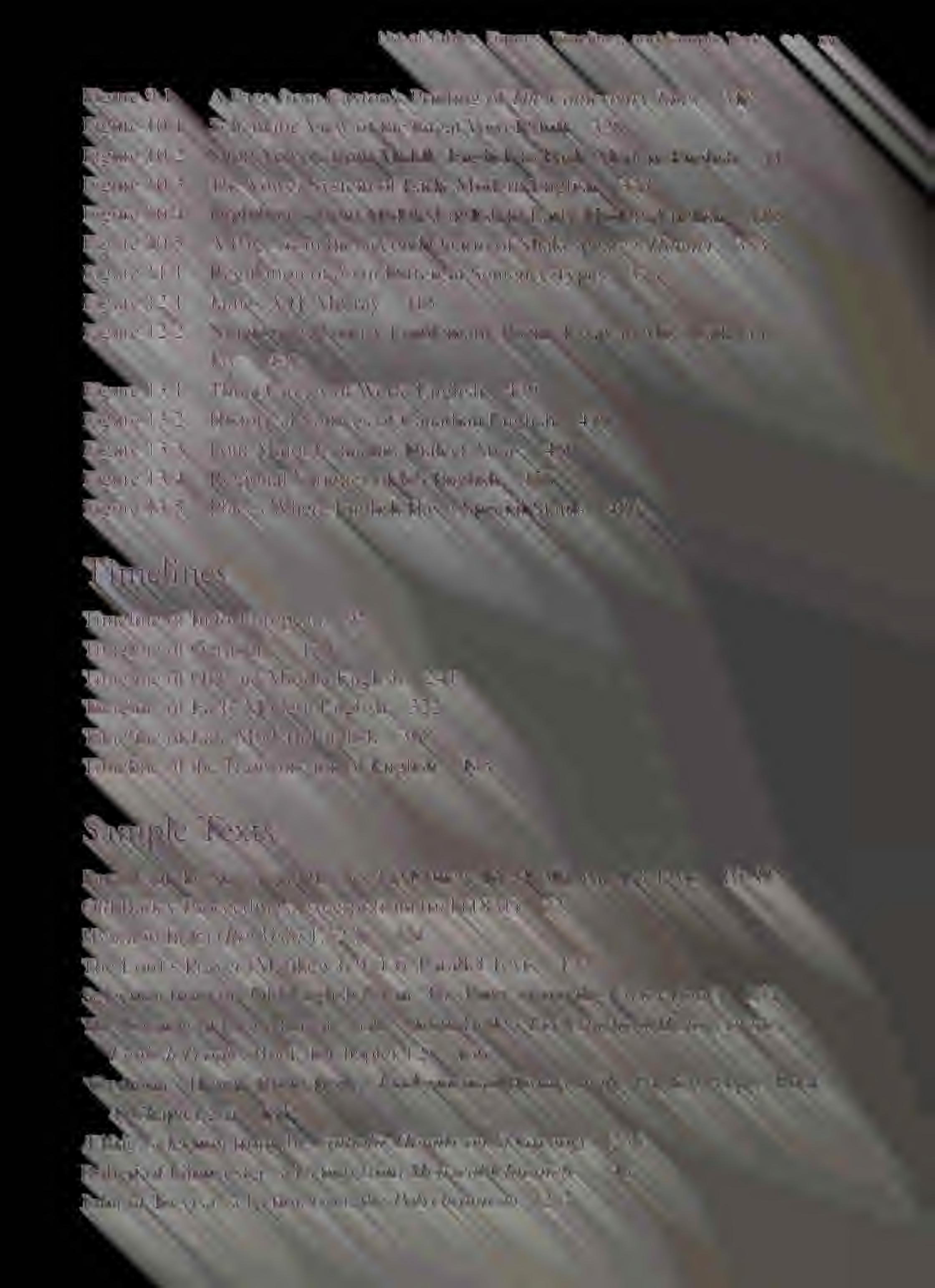The English Language A Linguistic History 3rd Edition Brinton
Visit to download the full and correct content document: https://textbookfull.com/product/the-english-language-a-linguistic-history-3rd-edition-b rinton/

More products digital (pdf, epub, mobi) instant download maybe you interests ...

How English became English a short history of a global language Horobin
https://textbookfull.com/product/how-english-became-english-ashort-history-of-a-global-language-horobin/

How English became English A Short History of a Global Language Simon Horobin
https://textbookfull.com/product/how-english-became-english-ashort-history-of-a-global-language-simon-horobin/

Introducing the History of the English Language 1st Edition Lerer
https://textbookfull.com/product/introducing-the-history-of-theenglish-language-1st-edition-lerer/

Advanced English Grammar: A Linguistic Approach Ilse Depraetere
https://textbookfull.com/product/advanced-english-grammar-alinguistic-approach-ilse-depraetere/

The Linguistic Turn of the English Renaissance: A Lacanian Perspective 1st Edition Zisser
https://textbookfull.com/product/the-linguistic-turn-of-theenglish-renaissance-a-lacanian-perspective-1st-edition-zisser/

Teaching English (1978) : A Linguistic Approach First Edition John Keen
https://textbookfull.com/product/teachingenglish-1978-a-linguistic-approach-first-edition-john-keen/

Advanced English Grammar A Linguistic Approach. 2nd Edition Ilse Depraetere
https://textbookfull.com/product/advanced-english-grammar-alinguistic-approach-2nd-edition-ilse-depraetere/

IB English A: Language and Literature IB English A: Language and Literature Course Book 2nd Edition Brian Chanen
https://textbookfull.com/product/ib-english-a-language-andliterature-ib-english-a-language-and-literature-course-book-2ndedition-brian-chanen/

Verb and Object Order in the History of English: A Language-Internal Account 1st Edition Chiara De Bastiani
https://textbookfull.com/product/verb-and-object-order-in-thehistory-of-english-a-language-internal-account-1st-editionchiara-de-bastiani/





























Another random document with no related content on Scribd:
evidence that the Strip, now a part of Oklahoma, would eventually prove to be the most productive portion of the State. Spring crops of all sorts were coming up in riotous profusion. Young orchards had been planted round many a homestead cabin; rows of slender saplings marked the site of future stately groves. The scattering fields that had been seeded to winter wheat gave promise of a tremendous yield and an average of more than twenty bushels to the acre was confidently predicted. Orderly garden plots were in evidence on every homestead.
Since his occupancy of the Sheriff’s office Freel had several times stopped at the Lassiters’ cabin. He had haunted Molly Lassiter’s footsteps for a year prior to that day when Carver’s inopportune arrival had put a stop to his advances. In his new guise as a moneyed, influential citizen he saw one more chance of gaining the girl’s favor. His manner was affable and without hint of previous unpleasant relations. Rather his attitude was one of friendly interest which any prosperous person might take in the affairs of a less fortunate acquaintance. Molly, believing that the past had best be left undisturbed, received him as she would any other casual acquaintance. On the occasion of this last visit Freel found Bart at home.
Bart had worked steadily, seldom straying far from home but instead finding relaxation at Carver’s bunk house where the grub-liners still convened. There were times when he exhibited real enthusiasm for his work and on such days he spoke of eventually buying out one or more neighbors and operating a farm which would one day rival Carver’s holdings across the ridge. There were other periods when the monotony of farm life maddened him and he grew moody and restless, conscious of the urge to straddle a horse and be off for some point where distance was not measured by neatly fenced section lines but instead was calculated in terms of a day’s travel on a horse. It was during the darkest moments of one of these moods that Freel dropped in.
Bart listened while Freel commented upon various business and political ventures upon which he was engaged. Bart was frankly disinterested, his one thought for the moment being a desire to step
up on a good horse and ride across a sage-brush desert in the fierce glare of the summer sun, or, as an alternative, to ride the same stretch in a screeching winter blizzard; it mattered little which so long as there would be neither fence nor human within a radius of twenty miles. All would have been well except that Freel, equally selfcentered, attributed Bart’s abstraction to a feeling of envy induced by the attractive word picture Freel had painted of his own successes. In parting he drew Bart aside.
“Any time I can hold out a helping hand you can count on me,” he assured. “I’m in better shape to help you on your feet than any man in these parts.”
Bart was not actively conscious that he was being patronized but he was aware of a sense of irritation, and the tone as well as the substance of the offer brought his ill humor to a sudden focus.
“Oh, hell!” he said wearily. “You can’t do me any favor except to let me alone.”
“That’s what I’ve been doing,” Freel returned. “Hadn’t you noticed?”
“I haven’t missed you,” Bart confessed. “But keep it up and maybe I will.”
“You’re somewhat in debt to me on that score right now,” Freel stated, and recited a few details to prove his point.
Bart’s home-coming with a wounded shoulder the day following the Wharton affair had created comment. His saddled horse had been found by a farmer near the point from which a second mount had been stolen, this last animal later recovered by the Kansas sheriff’s posse after its rider had made good his escape. Rumor had linked Bart’s name with these events and the news had trickled to the sheriff’s office.
“Do you think I’m asleep on the job?” Freel demanded. “I’ve known that all along. Don’t you call that letting you alone? It all dovetails right nicely, a clear case against you on both counts, robbery and horse stealing—two cases of horse stealing, in fact.”
“Oh, I didn’t bother to steal the second one,” Bart stated. “Don’t make your case too strong or maybe you’ll lose it. I run across Carver out there and we swapped mounts, me escaping while he led that Kansas outfit astray. Maybe you hadn’t heard that it was Carver’s horse I came riding home on—but I can cite you to a few witnesses who saw it.”
Freel pondered this point. He had not heard the name of the man picked up by the posse after the party they sought had presumably stolen his horse.
“I’ll make it a point to cover any such little details as that,” he said. “But you’re safe enough as long as you meet me halfway.”
“I’ll come the full distance and a few steps beyond,” Bart volunteered. “I could throw some light on that Wharton affair myself and some day I will.”
Freel experienced a recurrence of that apprehension which had assailed him at intervals since his participation in the Wharton event. He had never considered it possible that Bart could have determined the identity of any one of the four men who had chanced across him that night. It had all happened with such suddenness; a voice from the darkness ahead. Then Noll had shot. Freel had been unaware of the identity of Noll’s victim till after they had left the spot and Noll had announced that the voice was Bart’s. Even then he had not been sure of the point until hearing the rumors which he had just now recited to Bart. It had seemed equally certain that Bart could not have recognized him.
“You’ll have a chance to tell all you know to a jury,” Freel predicted.
“And right after I speak my piece they’ll cast a ballot to stretch your neck a foot long,” Bart announced.
“Mine!” Freel said. “What fool notion are you working on now?”
“I’m not working—just resting,” said Bart. “Here you come with all this patter about how you’ve befriended me by not having me jailed for something you did yourself. That’s real generosity. Maybe it’s never occurred to you that I recognized the four of you when you
came riding up on me that night when Noll tried his damnedest to kill me.”
Freel’s apprehension increased but he remained silent until Bart had finished.
“If I start remarking broadcast about that little event just how long do you imagine it would take folks to divine where the four of you had come from?” Bart inquired. “A few minutes back you was reciting about what a high place you’d attained in human affairs. Keep right on mounting—only keep it in mind that some day when time hangs heavy and I’m craving entertainment I’ll pull out your props and let you down hard.”
He turned his back on Freel and retired to the house. Freel returned to Oval Springs and sought a hasty conference with the mayor and the president of the bank. He was palpably nervous as he recounted the details of this complication.
“Get hold of yourself!” Wellman ordered. “You’re jumpy. What does it signify anyhow? One man’s wild yarn about hearing your voice in the dark wouldn’t even shake that alibi. It’s water-tight.”
Crowfoot nodded agreement and chewed placidly at his cigar. He could face such a situation without turning a hair—as could Wellman.
“Bart’s in no shape to do any commenting,” Crowfoot amplified.
“But I tell you he will,” Freel insisted.
“Sit down,” Wellman instructed. “Plant yourself in a chair and quit prowling in circles. You’ll wear out the rug.”
“Bart might be feeling a trifle venomous since Noll tried to down him,” Crowfoot conceded. “It would have been preferable if Noll had quit living before he took that shot at Bart. But in order to link you with it he’d have to convince folks that he recognized your voice at night, then prove that you’d come from Wharton instead of any one of a hundred other points on the map. Not a chance in ten thousand.”
“But Carver’s into it now,” Freel pointed out. “You know what that means. He’s been waiting for a chance at me.”
“What you mean is that you’ve been waiting for a chance at him,” Crowfoot corrected. “And you’re crediting him with holding the same sentiments toward you.” Crowfoot was not one to allow personal differences or dislikes to obscure his judgment. “He’s the kind that’ll not interest himself in your affairs unless you go romping over onto his reservation and prod him into hostilities that he’d likely be wanting to avoid if only you’d let him. You’d better let this man Carver strictly alone. He’ll do the same by you.”
Neither Wellman nor Freel was prepared to accept this bit of advice.
“Then I’ll just tender one more suggestion,” Crowfoot announced, after finding himself overruled. “If you’re set on this business, then I’d urge that you do it yourselves, just the two of you, instead of hiring it done.” He was familiar with Freel’s roundabout methods.
Wellman endorsed this last suggestion.
“Absolutely,” he agreed. “Me and Freel will tend to this matter in person.”
Freel failed to state whether or not these sentiments met with his full approval. Crowfoot regarded him closely, then stretched and rose from his chair.
“Once there was three men in a town,” he remarked. “The rest didn’t count overmuch. One of the three had sand but no brains. Another was equipped with cunning but was totally minus of nerve. The third had both sand and brains.”
“And which one was you?” Freel inquired.
“I mentioned myself last,” Crowfoot answered without hesitation. “And being equipped like I explained, it does look like I could do better to trail by myself instead of being mixed up with a pair of ratbrained miscreants like you. If you’re set on stirring up Carver, you can just count me out.”
He departed and left Freel and Wellman to perfect their own plans.
They conferred at some length and as a result Freel spent several days in making quiet investigations among the homesteaders north and west of the Half Diamond H. Another evidence of the change
that was taking place in the country was the fact that the code of silence and refusal to divulge information no longer prevailed. Many of the newcomers were willing, even eager, to impart any possible scrap of information. Freel found some who had noted Bart’s return with a crippled shoulder; others that would testify that the horse upon which he was mounted belonged to Carver. He discovered one man who had seen Bart ride up the Half Diamond H lane in the evening. In each instance Freel shook his head and commented upon the fact that it looked as if the two of them had been mixed up in it; that it certainly seemed inevitable that he should have to place them under arrest and charge them with the crime if the evidence kept piling up. In each case also he requested secrecy. In reality he gathered insufficient evidence to hold either of them overnight but he had created an abundance of witnesses to serve his purpose.
Some two weeks thereafter a man rode up to the rear door of the one saloon in the little town of Alvin a few miles down the valley from the Half Diamond H. He dropped his reins over a post a few feet from the door and entered. For an hour he loitered at a table, playing solitaire and making an occasional trip to the bar for a drink and a chat with the bartender.
“Nice place,” he commented after he felt that their acquaintance had ripened somewhat. “You own it?”
The man behind the bar nodded.
“Man by name of Carver live round here close?” the stranger inquired.
“A piece up the valley,” the bartender assented. “Not far.”
“Drop in here often, does he?” the man asked.
“Whenever he’s in town—couple of times a week average,” the proprietor informed. “Drops in for a glass of beer before riding home. Mostly he’s in of afternoons; once in a while of nights when some of the boys gather here. You wanting to see him?”
“Yes,” the other man admitted.
“You can ride out to his place in half an hour.”
“Rather see him first and size him up,” the stranger stated. “Harvest is coming on and he might use a hand. But I always like to look a man over before I hire out to him.”
The saloon keeper nodded without comment. This was no harvest hand. The stranger’s face was stamped with ruthlessness; straight thin lips, and above them a pair of wide-set cold black eyes.
“Point him out to me when he comes in, will you?” he requested. “So’s I can sort of size him up.”
Again the barman nodded. He noted the convenient arrangement; the open back door with the saddled horse just outside.
“Sure,” he laconically assented. “I’ll tip you.”
Carver failed to appear and when the usual evening crowd began to assemble the stranger departed. The following afternoon he reappeared, leaving his horse at the same convenient post just outside the rear entrance.
“You’d never recognize me if you was to see me again, now would you?” he asked the proprietor. “You couldn’t accurately describe me right now; and for all you can remember that bay horse of mine is a sorrel.”
He shoved two gold coins across the bar and fixed the other man with his black eyes. The saloon man pocketed the money.
“Correct on all counts,” he agreed.
The stranger returned to his table and the bartender, under pretense of arranging glassware and bottles, placed a long-barreled forty-five on a shelf just under the bar. One never could tell. He had been oldtime rider of the unowned lands and could rightly read his signs. A few stray customers dropped in and departed. The liveryman lingered over two glasses of beer. The banker stepped in for his afternoon nip the moment the bank was closed for the day, and the keeper of the general store came in with the proprietor of the lumber yard. Three neighboring farmers entered together and shook the dice to determine who should pay for the round. The stranger surveyed each new arrival, peering from beneath the brim of his hat
while apparently absorbed in his game. Each time the man behind the bar shook his head. When the last of these patrons had departed Carver came in alone.
“A pint bottle of your best beer for me, Jimmy,” he greeted. “An’ another one for you.”
As Carver crossed to the bar the proprietor noted that he was not wearing his gun. He had discarded the weapon the day of his return from Oval Springs the preceding fall and had never worn it since. The bartender gazed fixedly at the man at the table, then slowly shook his head again, a signal which Carver could not fail to observe.
Carver accorded the stranger one casual glance. He could see the rump of the horse that stood outside the open rear door. Jimmy spoke to the stranger.
“That fellow Carver you was wanting to see just rode up the street,” he said. “He’ll likely be in any time now.”
The man at the table nodded, frowning slightly at this reference before a third party. Carver turned, apparently noting his presence for the first time.
“Step up,” he invited. “I’ve only time for one; have to be dangling along toward home; but you can linger over yours. Name it.”
The stranger was anxious to be rid of him before the man he expected came in, so he moved to the bar in order to hasten proceedings. Jimmy set his drink before him. The man nodded his thanks and remained silent, not desiring to open a conversation lest it should cause his host to alter his decision to depart at once. Jimmy was slouching against the rear of the bar directly across from him, one hand resting on the shelf beneath it as if to support his weight. Carver picked up the pint of beer as if to drink from the bottle; then, as the stranger reached for his drink, Carver swung the heavy bottle by the neck. The man went down as the weapon struck him behind the ear.
“After your opening remarks it looked like the wise thing was to lay him out first and make inquiries later,” Carver said as he retrieved
the fallen man’s gun.
“He was out for you,” Jimmy informed. “I don’t know why but maybe you do.”
“Not an idea; never laid an eye on him before,” Carver asserted.
“He’s been waiting two days,” Jimmy said. He removed his hand from beneath the bar and exhibited the long-barreled gun. “I had this shoved against the front side of the bar within a foot of his vitals so I could touch it off through the wood in case of a slip. Them’s only half-inch boards there in front. You and me has been friends a long time and I was half minded to down him before you showed up; only you can’t put a man across just because he’s inquiring about a friend, no matter what you suspect about his intentions—not without getting thirty years or else take to the hills. But I was here to see that things came out all right.”
“I wonder now,” Carver said, looking down at the man on the floor. “I wonder who sent him.”
“You knew, didn’t you, that Freel has been round collecting evidence against Bart in that Wharton affair?” Jimmy asked. “I’ve been hearing that for quite a piece back. Folks get to talking over their drinks. Most always they do.” He recited a few comments which had come to his ears. “Just thought I’d tell you. If you look under that party’s vest you’ll find a deputy’s badge. That’s a hard layout up at the county seat and you’ve had words with different heads of the ring, so I gather.”
“That clears up the reason for his being here,” Carver said. “They sent him. He’d make a clean get-away if he could—flash that deputy’s badge if he couldn’t, and they’d back him up.”
“He don’t know that you’re Carver,” Jimmy said. “I’ll bring him round after you leave and explain that you was a friend of Carver’s and decided that things wasn’t right when I made that incautious remark. That will put me in the clear. I’ll announce how he’s unsafe in these parts; that you brought in twenty-odd friends to view him laying there, face up, on the floor; that they marked well his features and declared open season on him anywheres in this part of the State. If he
believes me he’ll high-tail for parts unknown—and if he don’t, why, I’ll send him there.”
Carver rode out to the Half Diamond H and entered the house. When he reappeared he was wearing his gun and he rode on across the ridge to the Lassiters. He found Bart seated on the corral bars, his chin propped in his hands as he gazed moodily across a field of ripening grain.
“How long since you indulged in some thoughtless comments about Freel’s being mixed up in that Wharton hold-up?” Carver asked.
“Two weeks—maybe three,” Bart returned. “He was so satisfied with himself that I just thought I’d tell him.”
“And right after that he started connecting you and me up with it,” Carver said. “He’s been exerting himself to inquire among folks about your horse being found up near where you departed with that old crow-bait you was on when I met you; about that Kansas outfit jumping a wounded outlaw and picking me up instead, and how you turned up on my horse, you being shot in the shoulder.”
“Sho!” Bart deprecated. “He couldn’t make that stick. You don’t imagine, now do you, that Freel’s fool enough to have us jailed? Not when I could spill what I know. He wouldn’t even consider it.”
“That’s what he wouldn’t!” Carver agreed. “He’s just creating a background. We’re not slated to languish in jail, you and me. We’re marked out for the slaughter.”
Bart brightened.
“No!” he exclaimed. “Surely you can’t mean that something is going to happen. It will provide me with a fresh interest in life if there’s a prospect that I might possibly lose it. And how will all this come to pass?”
“Killed while resisting arrest,” Carver stated.
“Sounds reasonable,” Bart admitted. “I’ll positively guarantee to resist.”
“Before you’re ever arrested you’ll be much too dead to make any protest,” Carver predicted. “Freel has planted the idea in folks’ minds that before long he’ll have to book you and me for that deal. It’s been whispered about and they’re sort of expecting it. Then some day he’ll drag in our corpses and announce that we’d been shot while resisting his efforts to take us.”
“Interesting but only part way convincing,” said Bart. “You’ve neglected to explain how he’s to gain possession of our corpses so he can start dragging ’em in. I’ll remonstrate with him considerable before I’ll let him have mine.”
“He won’t collect it in person,” Carver said.
“Maybe I’m supposed to send it to him,” Bart suggested. “But he don’t deserve any such favors from me. I consider his scheme a flat failure, myself.”
“That county-seat aggregation is a hard bunch to go up against, the way they’re sitting right now,” Carver said. “They’ve got influence and power behind ’em. This way of eliminating a troublesome party is time-tried and tested. It’s found favor with many a sheriff and chief of police before now and it’s an old favorite with Freel.”
“Then it appears that the clever thing to do is for us to organize too,” Bart volunteered. “You can act as the chief and send me out to get Freel. I’ll dry-gulch him so far from nowhere that even the coyotes won’t find him.”
“Some other time,” said Carver. “Not now. We could hardly ride into town and murder the mayor and the sheriff all in one day without some sort of excuse. It would create unfavorable comment. This deal down at Alvin bears the brand of Freel’s deep-seated planning. It’s likely they’ll come after us themselves the next time they try it, just so as to give it the earmarks of a lawful attempt to arrest. Meantime we’ll have to work up a background of our own. The county seat needs cleaning up wholesale. If a man’s going to live anywhere he might as well have decent conditions. Once folks get that in their minds we can defend ourselves and still render a patriotic service to the county as a whole.”
“All right,” Bart agreed. “After you’ve unfurled the flag I’ll lead the last desperate charge with the whole county cheering. But it still appears to me that it would be simpler for me to lay out behind the hedge somewheres and do a little bushwacking myself.”
“Meantime, just in case Freel sends out another hired killer, I wouldn’t lay myself open to any chance stranger that comes dropping along,” Carver advised.
“The first stranger that shows up anywhere within three hundred yards goes down in the smoke,” Bart assured.
Molly Lassiter came from the house as Carver turned to leave. He did not come often of late and she walked with him a short distance up the trail.
“We’ll start cutting next week,” Carver stated. Their talks were largely impersonal these days. “Harvest is crowding close to us now.”
“Bart expects to start cutting Monday,” she said. “How many bushels do you think your wheat will thresh out?”
“It’ll run close to twenty,” he estimated. “Maybe more. We ought to get fifteen thousand bushels or better.”
“And more next year,” she said. “You’ll put out more wheat this fall, won’t you?”
“Likely,” he answered. “I hadn’t quite made all my plans for next season.”
He had mentioned the fifteen thousand bushels of wheat casually and without elation. It would pay for the new farm machinery with which the Half Diamond H was now stocked but for which he still owed, leaving him a big margin for future operations. This first year’s crop would put him on a solid basis and well on his way toward the maturity of his original plan to buy all of the best land in the valley. By the time other homesteaders could prove up on their filings he would be in a position to buy out all who would sell. He had no present need even to avail himself of the assistance which both old Joe Hinman and Nate Younger were anxious to extend. Younger’s outfit had been the largest in the unowned lands in the old days and now
Carver was building it up into the largest of the new day that had dawned. He had been top hand for both the Box Bar and the Half Diamond H under the old régime, a moving spirit among the riders of the Cherokee Strip, and now he had become a leader among the settlers. Both of his old employers, having taken a part in raising him, were duly proud of the fact; theirs still the loyalty that had always prevailed between an owner and the men who rode for his brand. The easy road to success now opened invitingly to Carver but he found no joy in the prospect. He had worked steadily toward his original aim but his initial enthusiasm was lacking.
The girl had observed this change and it troubled her. Of late Carver had exhibited a restlessness that was akin to Bart’s; and she wondered. He had gone so far; would he turn back now?
She accompanied him but a short distance and the conversation was confined to impersonal topics. She observed that for the first time in six months he was wearing his gun. As they parted he noted her troubled gaze resting upon it.
“Sho! This?” he said, tapping the weapon. “I someway don’t feel dressed up without it. I wear it as an ornament, kind of, the way a girl wears a ribbon,” and he moved on up the trail.
A few days later Molly mounted the ridge and watched the start of the harvesting. There was nothing to attract swarms of harvest hands such as crowded into the country farther north where the whole landscape seemed a solid body of wheat. Another year, when the acreage seeded to wheat would be increased fourfold, then they would come. But Carver had found no scarcity of hands to help him harvest his crop. From her point of vantage the girl could see tallhatted, chap-clad men toiling in the fields. Later in the season, after the wheat had been stacked, she would see them plowing. They rode their horses out to their work as they had always done, and left them standing about.
She would see no other harvest such as this. Another season and the wheat fields of the Strip would be invaded by the riffraff that always came south for the harvest and followed it north. Then the tumbleweeds would be gone. Now they had rallied to lend a helping
hand to one of their own kind, one man who had understood. And as she watched them toiling at these unfamiliar tasks she experienced a thrill of sympathy for the men who had helped to make homes possible for others and now found no place in the new scheme of things for themselves. For the riders of the waste places had ever been the vanguards of civilization. Fur traders had skimmed the riches of their calling from a vast territory and departed, leaving it no more habitable than before; gold seekers had prospected the hills and passed on but the cowhands had stayed to make the West habitable for those who should follow And now that the followers had come there was no further use for the ones who had led the way.
As the summer advanced the girl observed how swiftly the ranks of the grub-liners were depleted as they were forced to realize the fact that spring work would never open up for their sort again. Families of Cherokees still prowled the countryside at will, pitching their teepees along the streams, the squaws begging incessantly from one homestead cabin to the next. The settlers, expecting nothing better from the Indians, were prone to tolerate this sort of nuisance but looked with increasing disfavor upon the nomadic white riders that drifted about in much the same aimless fashion. Yet they were not parasites, these men, even though the newcomers so viewed them. Rather they came from a proud fraternity. In grub-lining they had been merely following an ancient and respected custom of their kind and when they now found that this no longer prevailed they desisted. It was only through Carver’s insistence that grub-liners still continued to drop in at the Half Diamond H. Their presence created the one break in the monotony that seemed closing in upon him. He made that clear to each comer and urged each one to return. But another old custom was dying and the number of grub-line riders who turned up for meals at the Half Diamond H was depleted by half before the summer was ended, as these jobless ones drifted into other lines.
One by one, the girl watched them go and she wondered how they would fare in these new pursuits which they adopted, not from choice but from necessity. The majority would sink to oblivion, drudging at tasks which they had always despised. But there were
some whose names were slated for fame in the annals of this new Southwest.
Carl Mattison was destined to become one of the most-famed marshals of all time. Even now the fame of his reputation as a man hunter was mounting. The name of Crowfoot was slated to become synonymous with prestige and power, linked with perhaps the most impressive fortune in the whole Southwest. There would be many others who would attain high places. Milt Lassiter would create a place in history as one who would defy the law for a dozen years with a price on his head and with every officer in five States desirous of collecting it. And this last-named career was even now exerting its influence on Molly’s understanding of the conditions which prevailed in this new land.
In the main the old conventions were respected, old traditions upheld, but modified to fit conditions as they were, not as other communities decreed that they should be. Here actualities were everything, appearances nothing, and there was not yet that rigid adherence to minor banalities that were accepted as eternal verities in older communities where such details were considered the bulwark of smug respectability. Here a man was judged by what he stood for in his present environment, his daily relations with his neighbors, not by what his family had accomplished in generations past,—for the past had no part in this new land that lived in the present with an eye to the future. Ex-convicts were making a new start with their families; former wildlings were making good and the rising above past transgressions was considered a cause for congratulation, not one for reproach. Milt Lassiter’s ill fame did not react to the detriment of either Bart or the girl, their neighbors valuing the two for themselves alone.
This knowledge brought in a new doubt to Molly—a doubt which fostered a certain content. After all, in a land of new standards, was it right that her adherence to a moth-eaten tradition should keep Carver and herself apart? This thought, gradually crystallizing into a conviction, brought with it a measure of comfort, but Carver, not knowing, experienced a daily increase of restlessness and discontent.
Few times when the bunk house held more than three grub-liners and all too frequently it was unoccupied. Carver found time dragging slowly and days and nights were equally monotonous. He knew that he could sell his holdings for a considerable sum. Should he sell out and migrate to some point where there was still some open range available and buy out a small cow outfit? He debated this problem but lacked his usual gift of quick decision.
There came a night when several old friends rode up to the bunk house. Joe Hinman and Nate Younger dropped in for one of their frequent overnight visits and Bart Lassiter came across the ridge. A stud game was in order and Carver rose and went to the house, brought forth a silver dollar and addressed it.
“Little lonely dollar, you was to mount up to a million. You haven’t mounted that high yet but if I’d follow through it’s likely you’d attain it. But is that what we’re wanting after all? I’ll put you to the test—fair God or false—and let you decide it for me.”
He returned to the bunk house and took out a fifty-dollar stack of chips, tossing one red chip back and replacing it with the silver dollar.
Old Joe Hinman regarded the coin that crowned the stack of chips.
“Seems like I’ve seen the selfsame coin before,” he commented. “Surely now, you wouldn’t go and risk it. It’s led you quite a piece, that dollar has.”
“But maybe not in just the right direction,” Carver said. His thoughts reverted to the day he had acquired it.
“What depends upon the outcome?” old Joe inquired. “Which way will you leap?”
“Just this one stack,” said Carver. “If I double it I stay. If I lose I go. It means the difference between here and somewhere else; pumpkins or tumbleweeds, cows or crops—for one more year.”
An hour later he cashed in a double stack and the cards had decreed that he stay for another year.
Bart Lassiter leaned back in his chair and grinned sympathetically.
“My year has another six months to run,” he said. “I’ll be free before you regain your liberty. You’ll find me waiting for you somewhere out yonder when your sentence has expired.”
